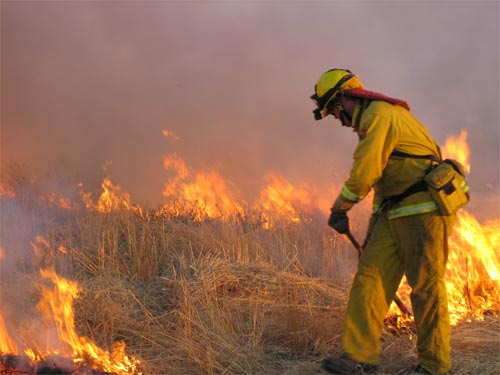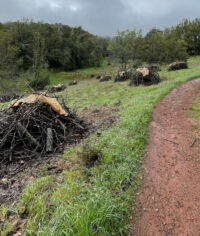Last month, the Community Foundation Sonoma County and Napa Valley Community Foundation released a report describing the results of a survey they commissioned to determine the impact that the October wildfires on Sonoma and Napa County nonprofits. The survey, conducted by the Center for Effective Philanthropy’s Advisory Services, was sent to 468 nonprofit organizations that were former grantees of the foundations. The survey response rate was 39%, with 184 nonprofits weighing in. Of the nonprofits that responded, 56 percent have budgets under $1 million. A total of 49% of the 86 Sonoma Valley nonprofits surveyed responded to the survey.
An overwhelming majority of the nonprofit respondents (85%) reported that their organization had been affected in some way by the wildfires. When asked how the fires had impacted them, 81% reported that they provided services to more individuals or organizations; 78% reported that their major donors or board members lost their home or suffered damage to their home; 78% reported that they added new services or programs; and 61% reported that they had to shift staff from other services or projects to fire recovery efforts.
The survey reported that among the populations served by the responding nonprofit organizations, as a result of the fires, 90% experienced emotional trauma; 86% lost their housing or their home suffered damage; 72% lost their job, business, or business-related equipment; and 60% suffered some other economic hardship. The top three needs among those impacted populations included financial assistance (70%), housing assistance for those who were displaced or lost their homes (69%), and mental health services (63%).
Almost 73% of the responding nonprofits indicated that they made some type of change to their year-end fundraising approach. Specifically, 36% added fundraising for their organization’s fire recovery efforts; 27% eliminated a fundraising event or campaign; 23% added fundraising for a local fire recovery fund; and 15% eliminated their year-end fundraising efforts. Only 18% of the organizations responding to the survey reported that they maintained the same level of funds raised compared to prior years, whereas 41% reported their funding was reduced compared to previous years. Approximately one-third of the responding organizations indicated that they had actually increased funds raised compared to previous years.
La Luz Center was one of the Sonoma Valley nonprofits that saw an uptick in donations as a result of the fires. La Luz Center is a family resource center that mainly serves Sonoma Valley’s low-income immigrant community. The fires destroyed or damaged numerous wineries, vineyards, homes, commercial businesses, restaurants and hotels/resorts where many La Luz clients work, leaving the majority of their Latino clients without income. This loss of income left many clients unable to pay rent and utilities and therefore at risk of eviction. To help their clients impacted by the fires, La Luz was one of three Sonoma Valley nonprofits to receive funding from the North Bay Fire Relief Fund.

La Luz received North Bay Fire Relief funding to provide case-managed cash assistance to over 1,000 community members. La Luz also received substantial funding from Tipping Point to fund its small business microloan program and launch its construction skills training program as a way to get Latino community members involved in the North Bay rebuilding efforts. La Luz Executive Director Juan Hernandez said, “The only way to prepare for a disaster is to go through a disaster.” He added that as soon as the leadership of La Luz Center realized that they were facing a long-term disaster, they decided that they would provide immediate relief for impacted families only until January 15 of this year, the deadline for which the funding they received from North Bay Fire Relief was required to be expended. He said, “The staff all pitched in to be sure families got the money they needed by that January 15 deadline. That was our number one goal and we succeeded.”
Hernandez added that after the fire relief support was completed, their goal was to move into the phase of fire recovery. “That’s where Tipping Point came in to help. Tipping Point funds will help us get people trained for construction jobs that will pay $20 to $25 an hour. We have a high cost of living here in Sonoma Valley and a jump in salary will help our community members over the long-term.” Additional Tipping Point funding will be used to support small business development efforts in the community, including microloans and business assistance support.
The Boys & Girls Clubs of Sonoma Valley also received North Bay Fire Relief funding to provide free summer camps for any children from families impacted by the wildfires. Boys & Girls Clubs’ CEO Cary Dacy said, “We are grateful to be able to meet the needs of the youth in our Valley impacted by the recent wildfires. Our Summer Camp, which serves 980 youth annually, provides educational programming that helps youth improve academically and socially during the summer months. We are fortunate to be able to partner with La Luz in identifying these youth who need us most, and ensure that they have the opportunity to participate in safe, enriching, and healthy summer activities.”
Another recipient of the North Bay Fire Relief funding is Vintage House. Its Executive Director Priscilla Essert said the funding will enable Vintage House “to put on an emergency preparedness workshop on June 1 for about 600 people plus offer emotional support groups in eight locations throughout Sonoma Valley.” Essert added that these support groups are designed to help people heal after experiencing fire-related Post Traumatic Stress Disorder.
When asked about their anticipated challenges for 2018, 81% of survey respondents ranked their top challenge as attracting new sources of funding, with maintaining funding from current sources a close second at 72%. Other than program grants, 67% reported that funding for general operating support would be the most helpful philanthropic support they could receive. Since a substantial number of our local nonprofits will need more assistance than ever before to make up the losses in income they experienced at the end of last year, I encourage our already-generous Sonoma Valley community members to continue being as generous as possible in 2018 to provide the support our nonprofit community is going to need to be sustainable in the aftermath of the biggest disaster Wine Country has ever experienced.
B.J. Bischoff is the owner of Bischoff Performance Improvement Consulting, a Sonoma firm specializing in building the capacity of nonprofit organizations and public sector agencies. She assists her clients with strategic planning, board and staff training, fund development, grant writing, and community relations. She is Past President of Impact100 Sonoma and serves as a Sonoma County Board of Supervisors’ appointee to the Sonoma County Portfolio of Model Upstream Programs Review Committee. [email protected].







Be First to Comment